Supporting Your Child's Learning
Please see the sections below for information on how families can help to support your children's learning at home.
Study Hacks
From the Sidelines have put together a series of podcasts, infographics and information videos to help families support their children with their studies. All study hacks can be found at the following links:
Study Hacks - Infographics
Designated Study Space
How you can create the perfect study space for your child at home.

Silent Focus
Our brain is not as efficient at multitasking as we think it is!

Distractions and Mobile Phones
Mobile phones and notifications are now part of our everyday life, but they have become the killer of focus and attention, especially when trying to concentrate or study.
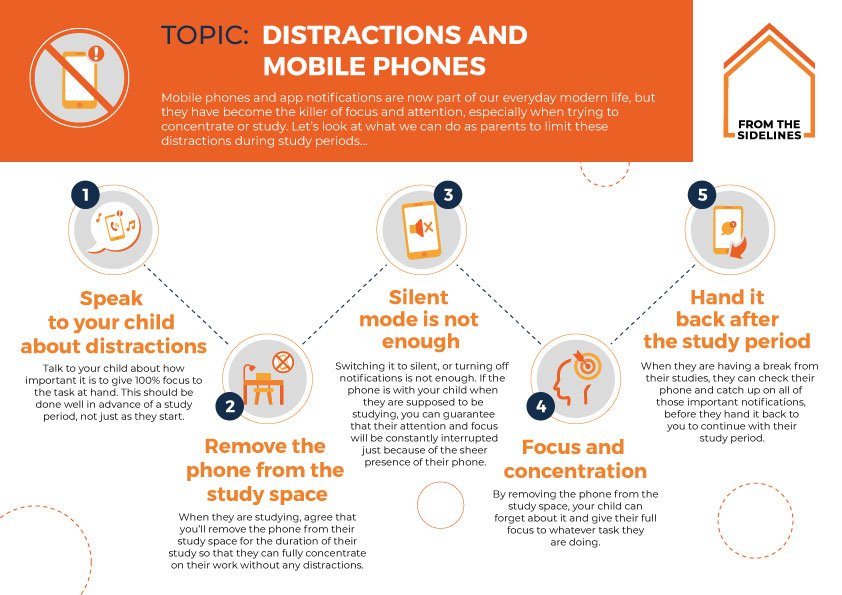
Rest and Sleep
Making sure that your child gets adequate rest and sleep every night is essential for not only a healthy lifestyle but it also plays a major part in the learning process.

Equipment Ready
One of the things that can cause interruption to your child’s study flow, is not having everything they need when they begin their period of study.

The Pomodoro Technique
The brain can only focus deeply and concentrate for a short period of time before it becomes fatigued. Therefore, the longer a child studies for without a break, the more inefficient they become.
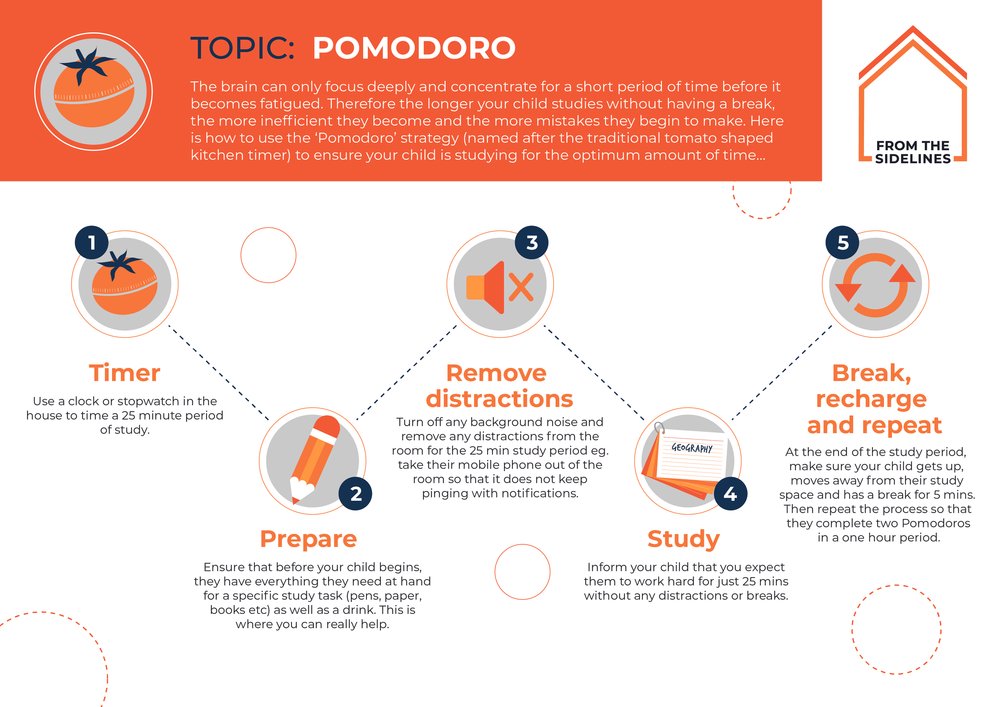
Retrieval Practice
Retrieval Practice is a powerful study tool that is important in the act of revision. It helps strengthen memory by pulling information out of your head rather than cramming information in.

Flashcards
Flashcards are the easiest and most effective way to recall information so that it sticks in your long term memory. Let’s look at how to create them, use them and organise them in the best way possible…

Brain Dump / Blurting
A ‘brain dump’ or ‘blurting’ is when you give your child a blank piece of paper and a pen and then ask them to ‘dump’ or ‘blurt’ everything they can remember about a specific topic.
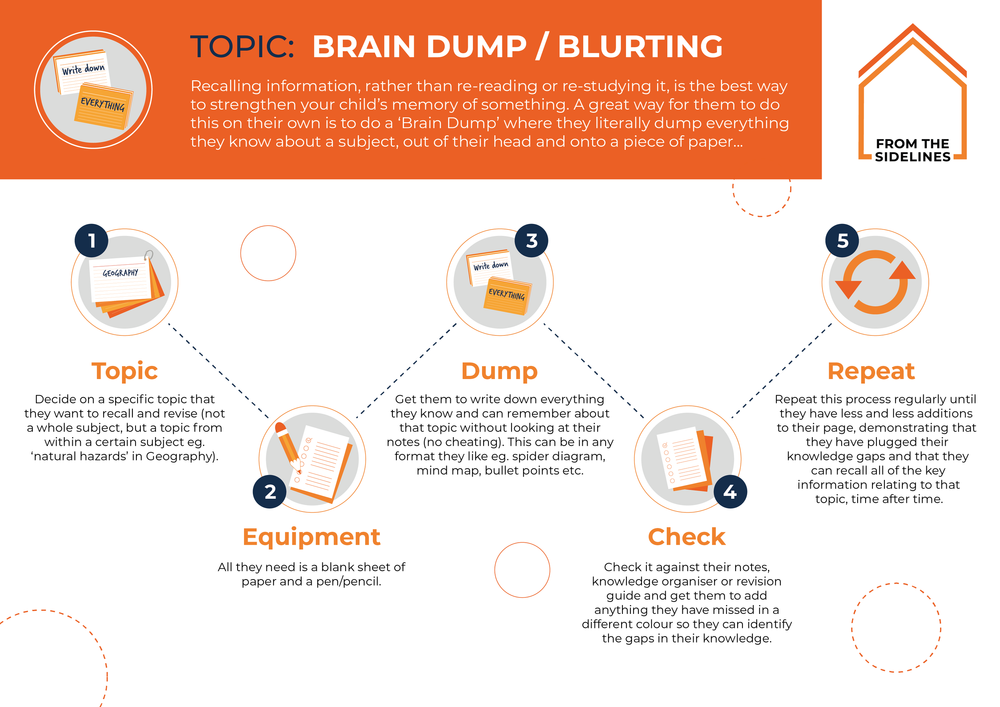
Look, Cover, Write, Check
This is a technique that works in a similar way to a ‘brain dump’ or ‘blurting’, but this time, it doesn’t have to be something your child learned in the past.

Habit Stacking
Getting into good study habits at home can be difficult to establish and even harder to maintain; the secret is in our everyday habits. The trick is to attach a new routine that they want to become a habit to an existing habit. This is what we call ‘Habit Stacking’.

Productivity
Productivity is a loaded word, and sometimes, it might feel like we’re never productive enough. But all we really need is good time management, uninterrupted focus and motivation!

False Sense of Familiarity
When we recognise something as familiar, our brain makes us think that we know more about the topic than we really do. Familiarity can be the enemy of real learning… but it doesn't have to be this way!
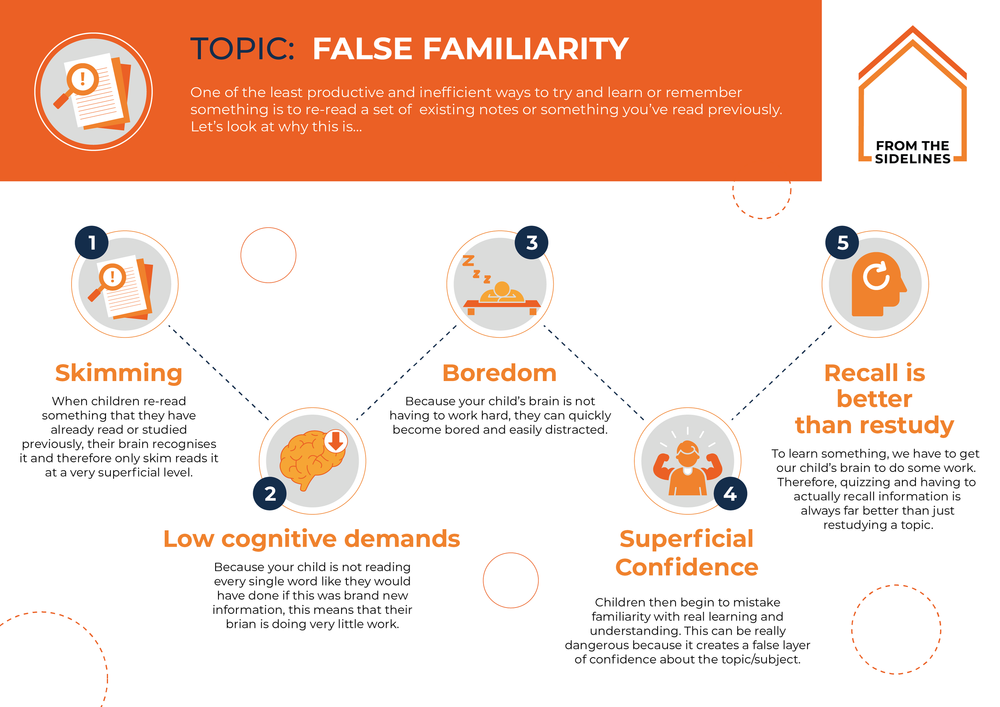
Desirable Difficulties
By getting your child to make learning harder for themselves, they are creating exactly the right conditions in which to remember something. We call this a ‘desirable difficulty’.
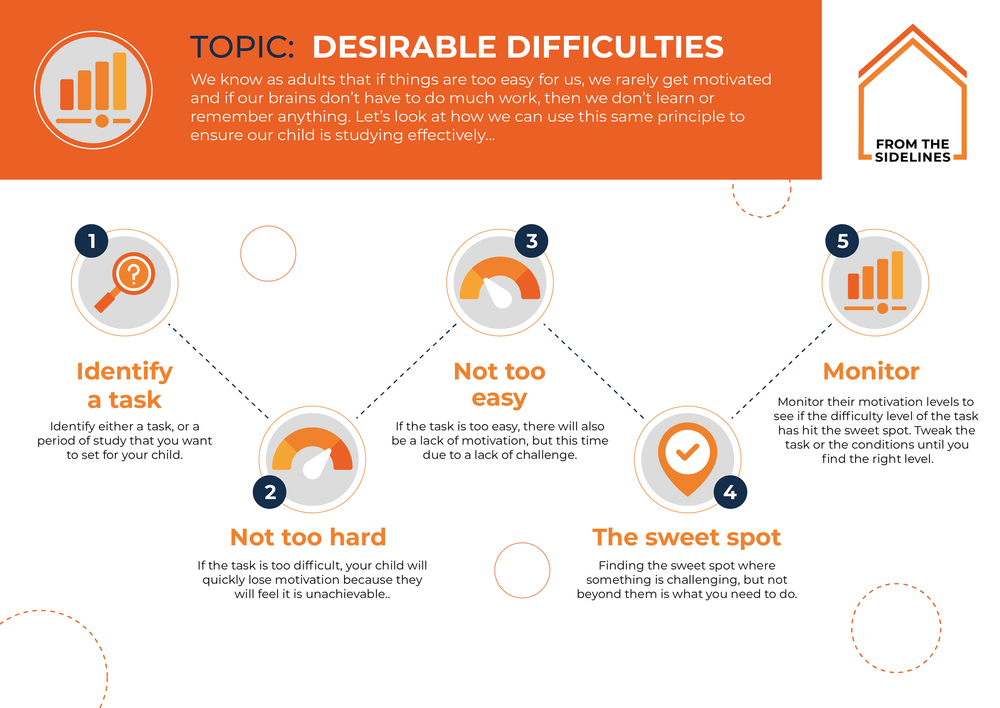
Distributed Practice
One of the most interesting, but least well known facts about how our brains remember information, is that as human beings we forget 90% of what we have been taught within the first 7 days, unless we go back and do something with that information to enable us to remember it.

Study Planner
Let us introduce you to the humble study planner, a great tool to help learners feel more responsible for their studies and prioritise appropriately!
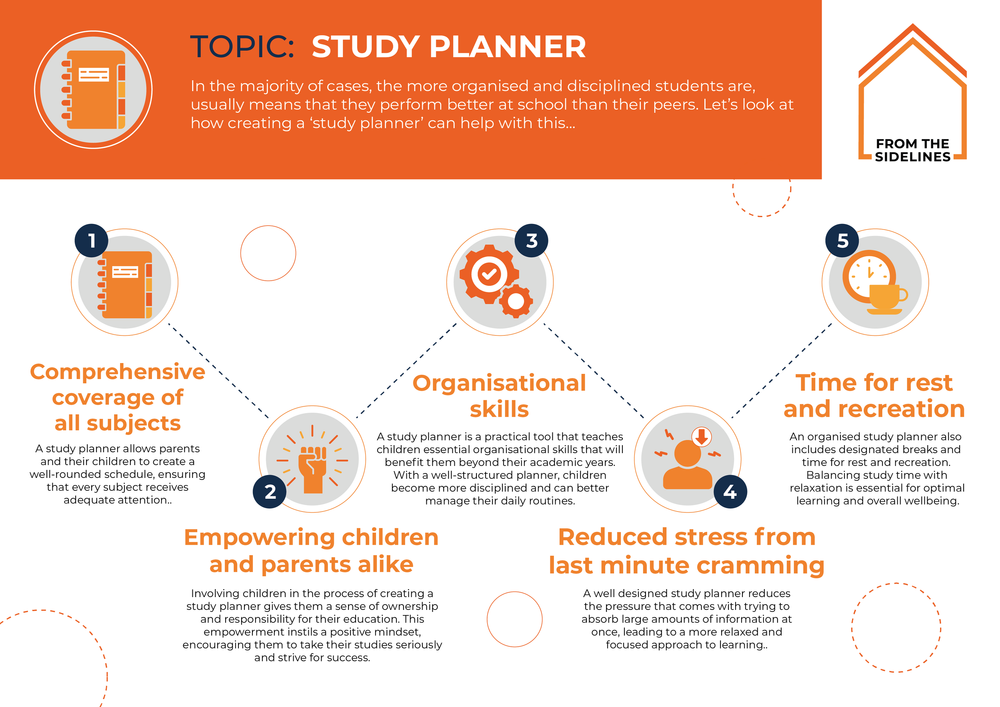
Motivation & Rewards
It's hard to stay motivated when there's nothing to look forward to. Have you tried scheduling little rewards and treats throughout your child's study sessions? It's time to step up to your new role: study buddy!
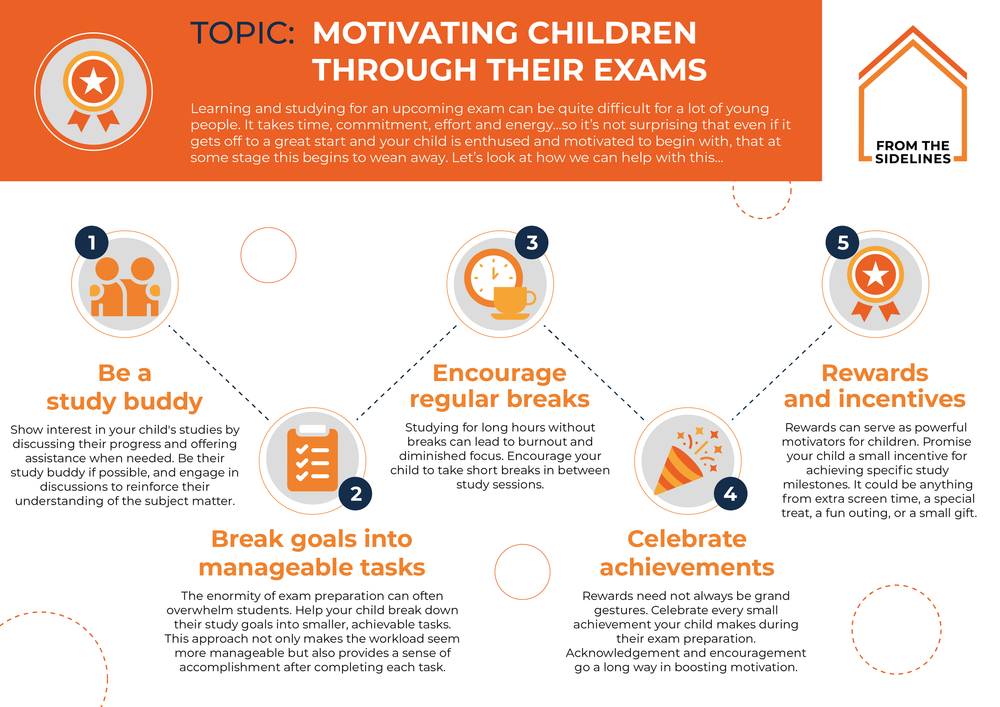
Night Before An Exam
We'd never expect an athlete to train right before their game or match and neither should a student before an exam!
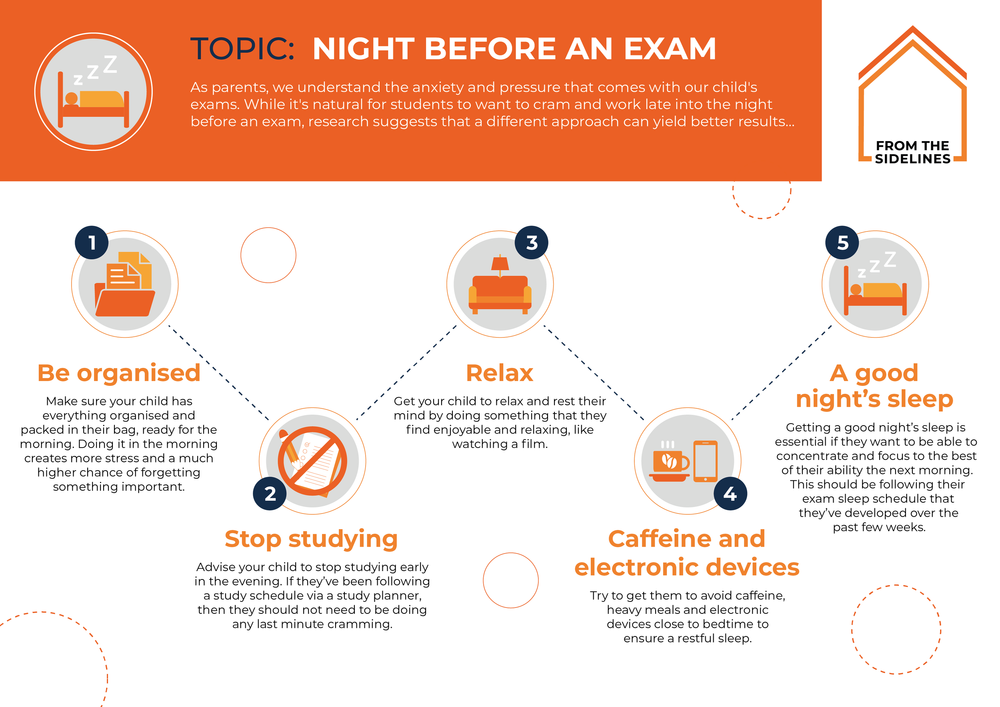
Breakfast, Hunger & Set Meal Times
Ever wonder about the impact of nutrition on academic performance? Dive into the crucial role that food plays during exam periods and revision!
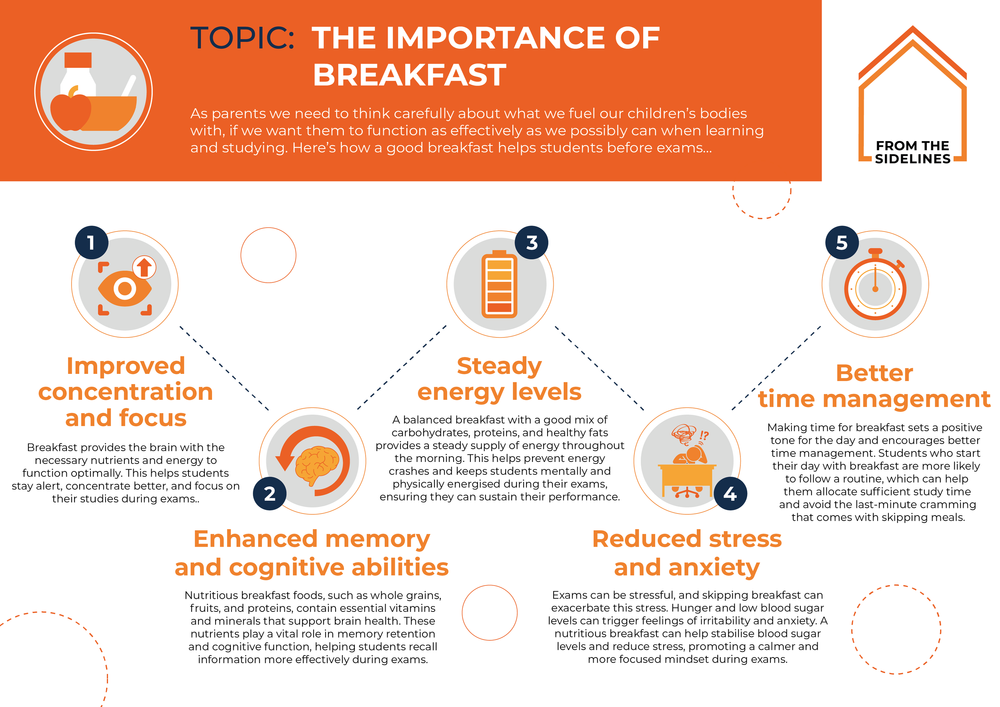
You Can’t Fool Your Body
Think about a time when you’ve needed to get to sleep but you can’t. Lying there actively thinking about needing to get to sleep is actually one of the worst things you can probably do. Unfortunately if we’re not tired and our body is not used to going to sleep at that time of night, then there’s very little you can do.

Stress Can Be Good
You heard it, stress can have its benefits!

Hydration and Concentration
It's no secret, you need to keep watered if you want to perform well!

Energy Drinks
Yes. Water may seem too simple to be that effective, but if drunk alongside a good intake of high-energy-yielding foods, it will always be a more effective source of hydration for your body, helping you to concentrate and focus.
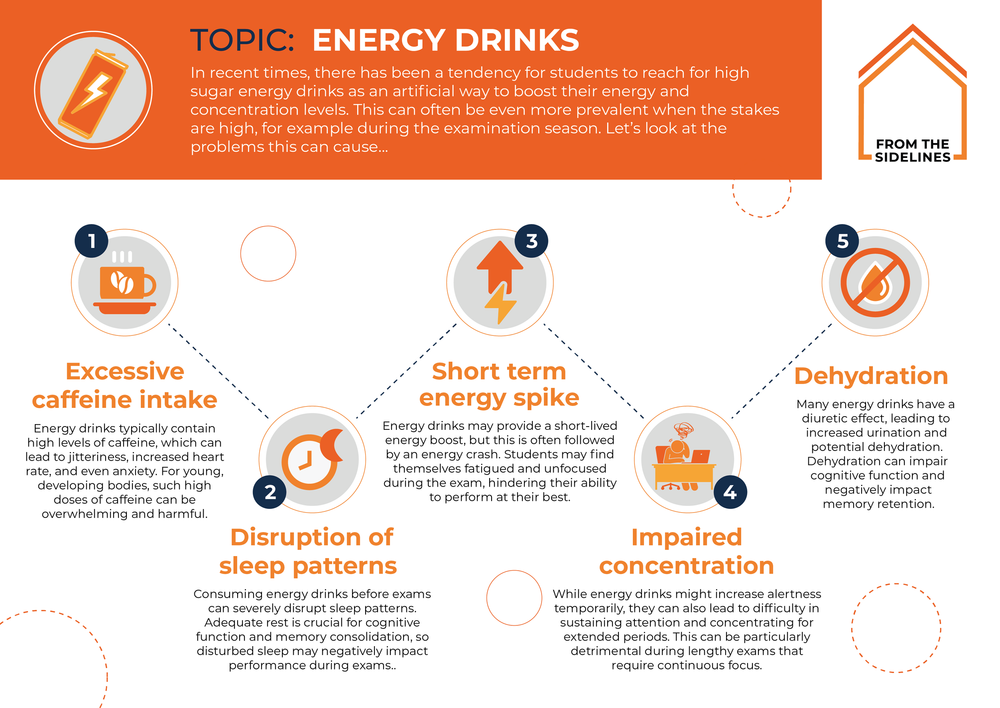
Movement and Exercise
By incorporating exercise into your daily routine, you are equipping yourself with valuable tools to excel academically, build resilience, and maintain a healthy approach to learning – qualities that will serve you well throughout life.
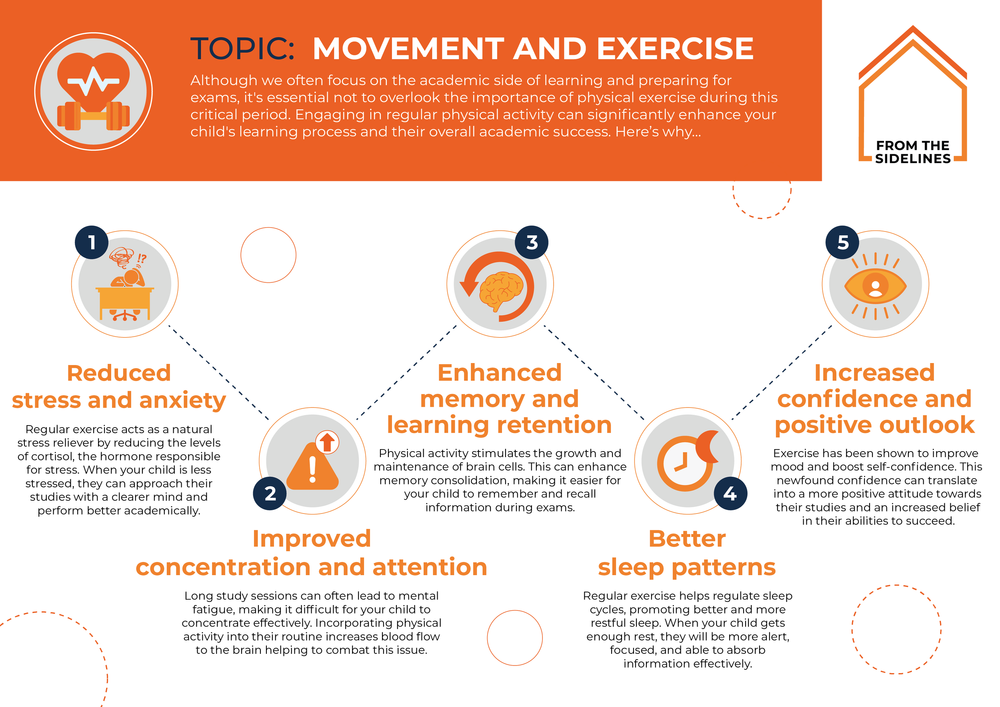
Study Hacks - 24 Top Tips
Top Tip #1 - Clear Space, Clear Mind
Top Tip #1
Make sure that any flat surface that your child is going to work on whilst studying, is clear of clutter. Working somewhere that is cluttered is not good for clear thinking. A clear space creates a clear mind.
Top Tip #2 - Quiet Times
Top Tip #2
When your child is studying, try to be as quiet as you can in the house for that 25-minute period, so they can completely focus and can't be distracted by whatever you are doing.
Top Tip #3 - Device Distractions
Top Tip #3
Don't be fooled by thinking your child needs their mobile phone as a calculator (all that will happen is that they will be distracted by the notifications on their phone). Just get them a calculator.
Top Tip #4 - Consistent Routines
Top Tip #4
During the holidays or weekends in the build up to exams, try to get your child to keep roughly the same consistent sleep and wake times that they do throughout the week. This will help maintain a consistent body clock and mean that their body doesn't have to keep adjusting every Monday.
Top Tip #5 - Equipment Ready
Top Tip #5
As well as stationery and books, it is also useful to get your child a drink and maybe a little snack for when they are studying. This is great to keep them fuelled and hydrated so they can focus, but also to stop them using the excuse that they need to leave their study period and break their concentration, in order to get a drink.
Top Tip #6 - Timed Study
Top Tip #6
Use a digital timer to time each 25-minute study period, so that you can pause it if your child is doing other things than actually working (looking for books, deciding to change tasks, going to the toilet etc.) The 25 minutes should be 25 minutes of hard work, not just 25 minutes 'at the desk'.
Top Tip #7 - Summarising Learning
Top Tip #7
After your child has completed a study period, ask them to summarise what they have learned (without reading from their notes). You will be able to judge the effectiveness of their last 25 minutes (and how much they have actually learned and remembered), based on how much they can confidently tell you.
Top Tip #8 - Flash Cards
Top Tip #8
To help organise flashcards, your child can hole punch them in the corner and add a treasury tag or a keyring loop so that all the cards for one subject, or one topic within a subject can be kept together.
Top Tip #9 - Questioning
Top Tip #9
One of the most effective ways for your child to learn something and then remember it, is to quiz them on it. This forces their brain to retrieve the information from their long-term memory, which strengthens the memory of that information. This can be as easy as asking some questions or getting them to summarise and verbalise what they have learned.
Top Tip #10 - Rules of Study
Top Tip #10
Speak to your child well in advance of any study session about the rules you are going to enforce regarding not having their mobile phone with them when they are studying. Trying to broach it 'in the moment' will undoubtedly end up with an argument, creating the wrong environment for a study session to take place.
Top Tip #11 - Distraction Control
Top Tip #11
Rather than your child handing their mobile phone over to you before they start a study session (if it's going to cause confrontation), agree a place that they will place their phone (on 'do not disturb'), so that it's not going to be a distraction. This also means that your child still feels in control.
Top Tip #12 - Schedule Study Times
Top Tip #12
When scheduling periods of study, you can schedule two Pomodoro's (25 minute periods of study) plus a 5 minute break into a one hour period e.g. 6pm - 6.25pm and then 6.30pm - 6.55pm.
Top Tip #13 - Real learning
Top Tip #13
If your child is just copying out, or re-reading their own study / class notes, then this is one of the most inefficient and ineffective ways to revise. It takes a lot of time and doesn't yield much gain. Their brain will not be doing much work because the material will be familiar. Therefore, they will mistake familiarity for real learning.
Top Tip #14 - Preparation and Support
Top Tip #14
Be prepared to potentially sit in the same room with your child when they study, in order to ensure that it happens (and in the conditions that you want). This might be a great opportunity to read a book in complete silence whilst they study. This way it also shows you are supporting them just by your sheer presence.
Top Tip #15 - Study Planner #1
Top Tip #15
Posting a study planner on the fridge or somewhere in the house that everyone can see, is a great way for everyone in the house to keep on top of when the agreed study periods are taking place.
Top Tip #16 - Study Planners #2
Top Tip #16
When creating a study planner with your child, colour code the subjects so it's easy to understand at a glance, meaning you can get a quick overview of the subject coverage every week.
Top Tip #17 - Treats and Rewards
Top Tip #17
Plan some small treats and rewards during the exam season to keep them going. This doesn't have to be something you spend money on, it might just be a nice cup of coffee or hot chocolate that you get for them after a study period. The more they feel loved and supported, the easier the tough times become.
Top Tip #18 - Lighting
Top Tip #18
Try to ensure that the place where your son or daughter studies is well lit. A dark room can cause extra strain on the eyes, meaning fatigue kicks in even quicker. Opening the curtains to let natural light in, or adding a small desk lamp can make a big difference.
Top Tip #19 - Breakfast Routines
Top Tip #19
Try to get your child into a routine when it comes to breakfast. It's very easy to skip breakfast if you don't know what to eat, or you're not used to sitting down every day to have breakfast. A routine makes this happen.
Top Tip #20 - Finding the Right Study Place
Top Tip #20
Your child needs to study in a place that is not naturally connected with relaxation. Trying to study on the bed or the sofa creates a disconnect in the mind, because the brain associates those places with relaxation. Therefore, it's a lot harder for your child to get into a 'work mode'. Studying in places like this will often yield very little productivity.
Top Tip #21 - Consistent Study Times
Top Tip #21
When planning a study timetable at home, try to keep to the same consistent times (either throughout the day during a holiday period, or during the evening). Your child will be used to consistent blocks of timings at school, so this will create a sense of familiarity.
Top Tip #22 - Keeping Hydrated
Top Tip #22
If your child suddenly starts drinking more water around exam time, then their body won't be used to this, meaning they will need to go to the toilet more often. This needs to be built up over time, so that their body gets used to it.
Top Tip #23 - Full of Energy!
Top Tip #23
Bananas are the best quick snack for sustained energy as they contain helpful nutrients that make the body feel full of energy. They can help performance and endurance just as much as a carbohydrate drink.
Top Tip #24 - Movement Breaks
Top Tip #24
During the 5-minute breaks that your child has in between their 25-minute study periods (Pomodoros), encourage them to get up and walk around. This gets the blood and oxygen flowing around their body again, acting as a physical reset before they sit down again for their next study period.
Chaucer Wider Reading
Please see the links below for wider reading resources for students, linked to what they have been learning each half-term!
